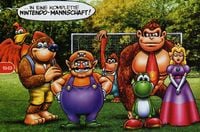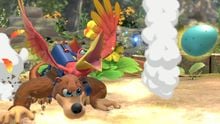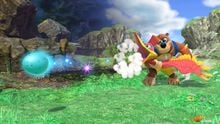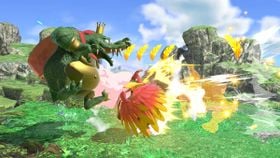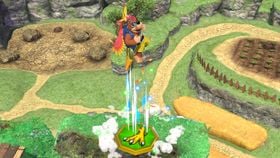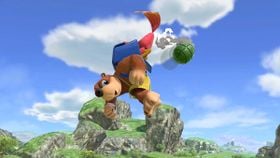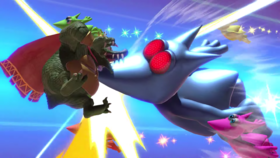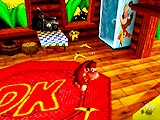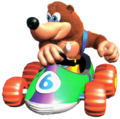Banjo
| Banjo | |
|---|---|
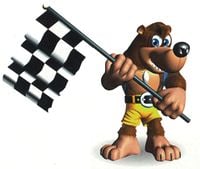 Diddy Kong Racing artwork | |
| Full name | Banjo the Honey Bear |
| Species | Honey Bear[1] |
| First appearance | Diddy Kong Racing (1997, overall) Banjo-Kazooie (1998, home series) |
| Latest appearance | Super Smash Bros. Ultimate (Challenger Pack 3) (2019) |
| Portrayed by | Chris Sutherland (1997–present)[2][3] |
- “I'm Banjo!”
- —Banjo, Diddy Kong Racing
Banjo is one of the two protagonists of the Banjo-Kazooie franchise, along with his best friend, Kazooie. However, his first appearance is in Diddy Kong Racing, in which he is a playable character to promote his then-upcoming title, Banjo-Kazooie.[citation needed] He is a honey bear with light-brown fur, tan skin, blue eyes, and a black nose, and he wears a shark-tooth necklace, yellow shorts, and a blue backpack that houses Kazooie. Banjo is owned by Rare Ltd. In 2002, Rare was sold to Microsoft, and the rights of Banjo, Kazooie and Conker were transferred to the company in exchange for Nintendo keeping Rare's Donkey Kong additions.
History[edit]
Diddy Kong Racing[edit]
In Diddy Kong Racing, when Wizpig invaded Timber's Island, Timber calls for Diddy Kong's assistance. In turn, he sends Squawks to contact his friends, one of whom is Banjo. All the characters compete in a variety of racing challenges to liberate the island and decide who would race Wizpig. Eventually, the eight racers, with the help of Taj and T.T., drove Wizpig back to his home planet, Future Fun Land. However, Wizpig returns, and the racers go to his homeworld. At the end of the world, the winning character races Wizpig again, who rides on a rocket missile for the rematch. On the character selection screen, Banjo's theme instrument is the banjo. The menu's theme is re-composed in a banjo when the player highlights him. Like the other characters, Banjo says his name when he is selected. As a heavyweight racer, Banjo has slow acceleration, which is compensated for a high top speed (57 MPH without Bananas). His handling is below average but still exceeds Krunch's.
Since Microsoft had direct ownership over Banjo and Conker, both of them do not appear in Diddy Kong Racing DS. Instead, they were replaced with Tiny Kong and Dixie Kong, respectively. Despite this, Banjo's theme instrument was left intact, and it plays both on the character selection and the game's introduction sequence. Banjo's statistics were also retained for Tiny Kong, who was likely redesigned for Banjo's heavyweight feature.
Mario no Bōken Land[edit]
Banjo makes a small, non-speaking cameo in the Diddy Kong Racing story segment of Mario no Bōken Land, titled "Go Go Diddy!". The comic shows him participating in a race with his friends, with him being in sixth place.
4-koma Gag Battle[edit]
Banjo appears throughout the 4-koma Gag Battle manga adaptation of Diddy Kong Racing. A certain four panel comic provides an explanation for what was in his backpack during Diddy Kong Racing, since Kazooie was absent: the backpack was filled with a beehive full of bees.
N-Gang[edit]
Banjo and Kazooie make a brief cameo at the end of the N-Gang comic "Freeze Frame", where they are seen celebrating alongside many other Nintendo characters.
Banjo appears in the N-Gang comic, "N-Gang vs. Nintendo", where he played on the same soccer camp team with Kazooie, Wario, Yoshi, Princess Peach, Donkey Kong, and Lanky Kong. Mario refereed the match.
Banjo makes an appearance in the N-Gang comic "Die Hexe lacht um Mitternacht". After Gruntilda transformed Toni and VIP into hot dogs and leaves to reek havoc into the city, Big B. and Gecko arrives and devise a plan to defeat Gruntilda. They then use VIP's machine to bring Banjo into the real world, and then launches eggs at the witch to defeat her. After that, they all celebrate.
Mario Artist: Paint Studio[edit]
Banjo appears in some of the character stamps in Mario Artist: Paint Studio, along with other characters from Diddy Kong Racing and Banjo-Kazooie.
Super Smash Bros. Ultimate[edit]
| Super Smash Bros. fighter Banjo & Kazooie |
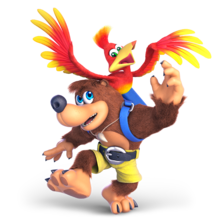
|
| Game appearances |
|---|
| Super Smash Bros. Ultimate (downloadable) |
| Special moves |
| Standard: Egg Firing / Breegull Blaster Side: Wonderwing Up: Shock Spring Jump Down: Rear Egg Final Smash: The Mighty Jinjonator |
| Battle entrance |
| Banjo appears from a Jiggy-shaped portal with Kazooie, bowing. |
- SmashWiki article: Banjo & Kazooie (SSBU)
Banjo, alongside Kazooie and the heroes of Dragon Quest, were announced as playable fighters in Super Smash Bros. Ultimate during the E3 2019 Nintendo Direct on June 11 (PDT). This marks their first non-cameo appearance in a new game since Sonic & Sega All-Stars Racing with Banjo-Kazooie, which was released for the Xbox 360 in 2010, as well as the duo's first appearance on a Nintendo console since Banjo-Pilot for the Game Boy Advance in 2005. Banjo & Kazooie were released on September 4, 2019 (PDT) as part of Challenger Pack 3.
The reveal trailer for the duo heavily references King K. Rool's original reveal trailer, with Donkey Kong, Diddy Kong, and King K. Rool looking outside the window of DK's tree house and seeing a silhouette of Banjo & Kazooie. It is then revealed to be Duck Hunt playing a prank, much like how the K. Rool reveal trailer had King Dedede pretending to be King K. Rool. Banjo & Kazooie then appear from the sky and knock Duck Hunt out of frame, with Banjo holding his namesake instrument. Banjo and Kazooie appear in Sephiroth's reveal trailer, where they are shocked to see him descend from the sky.
Banjo & Kazooie's moveset and appearances are directly pulled from their two Nintendo 64 titles, Banjo-Kazooie and Banjo-Tooie, though they also sport a few original attacks. Spiral Mountain, the location of their home, serves as the representation for their stage. Regarding weight, Banjo & Kazooie are collectively a heavyweight, being heavier than Link, Yoshi, Captain Falcon, Mii Gunner, and Min Min, but lighter than Wario, Ike, Ridley, Simon, and Richter, while having the same weight as Snake and R.O.B.
Classic Mode route[edit]
Banjo & Kazooie's Classic Mode route pits them against fighters that work as a team. Their final bosses are Master Hand and Crazy Hand, who both work as a team and are fought in any difficulty.
| Perfect Partners | ||||
|---|---|---|---|---|
| Round | Opponent(s) | Stage | Song | |
| 1 | Duck Hunt (brown/red costume) | Spiral Mountain | Main Theme - Banjo-Kazooie | |
| 2 | Rosalina & Luma | Tortimer Island | Treasure Trove Cove | |
| 3 | Ice Climbers | Summit | Freezeezy Peak | |
| 4 | Link, Zelda | Mushroomy Kingdom | Gobi's Valley | |
| 5 | Fox (dark costume), Falco (dark costume) | Luigi's Mansion | Mad Monster Mansion | |
| 6 | Donkey Kong, Diddy Kong | Jungle Japes | Donkey Kong Country Returns | |
| Final | Master Hand, Crazy Hand | Final Destination | Master Hand / Crazy Hand | |
Special moves[edit]
Egg Firing / Breegull Blaster[edit]
- SmashWiki article: Egg Firing / Breegull Blaster
Egg Firing is Banjo & Kazooie's standard special move, which involves Banjo crouching, and Kazooie shooting a Blue Egg forward. This egg is affected by gravity, and is a weak projectile that will cause mild flinching. If Banjo and Kazooie use this move in midair, their falling speed is slower.
When the standard special move button is held down, the move transitions to Breegull Blaster. Banjo will take Kazooie out the backpack and hold her like a gun; holding or mashing attack or special buttons during Breegull Blaster, will make the eggs fire at twice the speed of the Egg Firing move, with Banjo now able to walk around while shooting. These eggs deal less damage than from Egg Firing, especially with repeated hits on the same player. Breegull Blaster can be canceled by shielding, crouching, grabbing, or performing a side, up or down special input. These two moves originate from Banjo-Kazooie and Banjo-Tooie, respectively.
- Names in other languages
| Language | Name | Meaning |
|---|---|---|
| Japanese | タマゴミサイル/タマゴばきゅーん Tamago Misairu / Tamago Bakyūn |
Egg Missile / Egg Kaboom |
| Chinese | 蛋导弹/蛋砰砰枪 Dàn Dǎodàn / Dàn Pēngpēng Qiāng |
Egg Missile / Egg Kaboom Gun |
| Dutch | Eieren Vuren / Bazoo-Kazooie |
- |
| French | Jet d'œufs / Blaster Breegull |
- |
| German | Eitacke / Bazoo-Kazoo |
- |
| Italian | Fucile a uova / Pelicannone |
- |
| Russian | Яйцемет / Бригал-бластер Yaitsemet / Brigal-blaster |
- |
| Spanish | Disparo de Huevos / Arma Alada |
- |
Wonderwing[edit]
- SmashWiki article: Wonderwing
Wonderwing is Banjo & Kazooie's side special move. The move involves Banjo doing a side charge forward with Kazooie placing a wing over the duo, acting as a shield. The attack is very powerful, but they can only use the move five times per stock, as represented with five Gold Feathers displaying each time they perform the move. Once they run out of feathers for the stock, the duo will trip when attempting to perform it. In Sudden Death and Super Sudden Death, the duo only gets one feather, and in stamina battles, the numbers of feathers is determined by their starting HP. The move originates from Banjo-Kazooie.
- Names in other languages
| Language | Name | Meaning |
|---|---|---|
| Japanese | ワンダーウイング Wandā Uingu |
Wonderwing |
| Chinese | 惊奇羽翼 Jīngqí Yǔyì |
Surprise Wing |
| Dutch | Wondervleugel |
- |
| French (NOA) | Bouclier miracle |
- |
| German | Wunderflügel |
- |
| Italian | Scudo alare |
- |
| Spanish (NOA) | Ala de las Maravillas |
- |
Shock Spring Jump[edit]
- SmashWiki article: Shock Spring Jump
Shock Spring Jump is Banjo & Kazooie's up special move. The move involves the duo using a Shock Spring Pad that spontaneously appears under them, to launch themselves upwards into the air. The pad then acts like Sonic the Hedgehog's Spring Jump move, in the sense the pad falls downwards (if the duo uses the move in midair), which can hurt any opponent that comes in contact with it. The move can be slightly charged for a slight increase in jump height. The move originates from Banjo-Kazooie.
- Names in other languages
| Language | Name | Meaning |
|---|---|---|
| Japanese | ショックジャンプ Shokku Janpu |
Shock Jump |
| Chinese | 震撼跳跃 Zhènhàn Tiàoyuè |
Shocking Jump |
| Dutch | Trampolinesprong |
- |
| French (NOA) | Super saut |
- |
| German | Supersprung |
- |
| Italian | Salto choccante |
- |
| Spanish (NOA) | Salto de Resortes de Impacto |
- |
Rear Egg[edit]
- SmashWiki article: Rear Egg
Rear Egg is Banjo & Kazooie's down special move. The move involves Banjo crouching, while Kazooie shoots a Grenade Egg backwards (opposite direction of which they are facing). The egg bounces in an unpredictable pattern, before detonating either on contact or after several seconds. This egg can be picked up by any players to be tossed again, but it can also explode in the player's hands if it is not thrown fast enough. If the egg detonates from contact of an opponent, said explosion will not harm Banjo and Kazooie, but if exploding on timer, or in Banjo's hands, it will harm the duo. Banjo and Kazooie can only fire one Grenade Egg at a time. The Rear Egg move originates from Banjo-Kazooie, while Grenade Eggs originate from Banjo-Tooie.
- Names in other languages
| Language | Name | Meaning |
|---|---|---|
| Japanese | おケツタマゴ Oketsu Tamago |
Ass Egg |
| Chinese | 屁屁蛋 Pìpì Dàn |
Ass Egg |
| Dutch | Windei |
Wind Egg |
| French | Jet arrière |
Rear Jet |
| German | Bürzel-Ei |
Rump Egg |
| Italian | Lancio all'indietro |
Backward Throw |
| Spanish | Disparo de Huevos Hacia Atrás |
Backward Egg Shot |
Final Smash[edit]
The Mighty Jinjonator[edit]
- SmashWiki article: The Mighty Jinjonator
The Mighty Jinjonator is Banjo & Kazooie's Final Smash. The move must be performed in close proximity of an opponent (or opponents), to which Banjo and Kazooie will summon the statue of the Jinjonator from under the opponent(s). A quick cutscene begins which shows the Jinjonator statue breaking apart, revealing the Jinjonator. The Jinjonator will then begin to fly and ram into a trapped opponent multiple times, before charging forward for a final hit with four other Jinjos. Only one opponent can be caught in the cutscene, but multiple opponents can take damage from the attack. The Mighty Jinjonator originates from the final battle and ending of Banjo-Kazooie, where it was used to defeat the final boss of the game, Gruntilda Winkybunion.
- Names in other languages
| Language | Name | Meaning |
|---|---|---|
| Japanese | ジンジョネーター Jinjonētā |
Jinjonator |
| Chinese | 好啾终结者 Hǎojiū Zhōngjiézhě |
Jinjo Terminator |
| Dutch | De Almachtige Jinjonator |
|
| French (NOA) | Le Grand Jinjonator |
- |
| German | Der hammerstarke Jinjonator |
|
| Italian | Il grande Jinjonatore |
|
| Korean | 진조네이터 Jinjoneiteo |
Jinjonator |
| Spanish (NOA) | El Poderoso Jinjonator |
- |
Unused appearances[edit]
Donkey Kong 64[edit]
Both Banjo and Kazooie made a cameo in early versions of Donkey Kong 64, but were ultimately cut from the final game. Their faces were going to appear on a shower stall in DK's Tree House.
Profiles and statistics[edit]
Diddy Kong Racing[edit]
- Character stats
- Weight: Heavy
- Acceleration: 2/5
- Handling: 2/5
- Speed: 3.5/5
- Color: Turquoise
- Instruction booklet bio: "(Low acceleration, heavy weight, good handling, high top speed) Even before the start of his future partnership with Kazooie, Banjo isn’t one to turn down the chance of an adventure. So when Squawks brings the message from his pal Diddy Kong, the Honey Bear stuffs a few things into his trusty backpack and takes to his heels."[4]
- Player's Guide: "When Squawks brought Diddy’s call for help, Banjo didn’t hestitate—he strapped on his trusty backpack and hit the road immediately. He has also agreed to take on a totally different adventure with his partner, Kazooie, so this busy bear will have a lot to keep him occupied for some time to come."[5]
- Nintendo Power Volume 103: "Like Conker, Banjo is sort of hanging out on Timber’s Island while his own game gets polished for release. The happy-go-lucky honey bear has good handling for a heavy guy, but his acceleration is what you would expect from a bear. On the other hand, Banjo has excellent top-end speed for straightaways."[6]
- Diddy's Drivers Ed: "Banjo is another heavyweight racer, but his acceleration and handling are acceptable. He's a great choice for piloting a hovercraft. In many instances, Banjo will have to use the sharp turn technique to take corners cleanly."[7]
- Nintendo 64 Game Secrets, 1999 Edition Prima's Official Strategy Guide: "Banjo is one of the harder characters to control, and his acceleration is low. Of course, his heavier weight also means that, once he builds up some momentum, his top speed is second only to Krunch. On a tightly turning course, however, there’s little chance for his extra speed to come into play: He’s always in the process of accelerating, and then skidding through the next turn."[8]
- Rarewhere: "Even before the start of his future partnership with Kazooie, Banjo isn’t one to turn down the chance of an adventure. So when Squawks brings the message from his pal Diddy, the Honey Bear stuffs a few things into his trusty backpack and takes to his heels."[9]
Super Smash Bros. Ultimate[edit]
| Spirit #1337 Banjo & Kazooie | ||

|
Series/game | Banjo-Kazooie Series |
| Type | Fighter | |
| How to obtain | Classic Mode as Banjo & Kazooie | |
- Official website: The missing piece of the puzzle is found as Banjo & Kazooie join Super Smash Bros. Ultimate as a playable fighter! With Banjo’s bare hands to bruise rivals up close and Kazooie’s egg-cellent shooting skills, your rivals will be singing the blues in no time. For their Final Smash, these perfect partners call upon a flock of Jinjos and the Mighty Jinjonator to deal the final blow to any “feeble jerk” that may stand in their way!
Palutena's Guidance[edit]
Banjo & Kazooie share this stock conversation with all other Fighters Pass characters. It was originally used for Mewtwo, Lucas, Roy, Ryu, Cloud, Corrin, and Bayonetta in Super Smash Bros. for Wii U, who are downloadable fighters in that game.
- Pit: Who is THAT?
- Palutena: I have no data on this fighter. I can't believe it!
- Viridi: It must be an intruder from another dimension!
- Pit: Whoever it is, the goal remains the same: to fight and win!
List of Super Mario appearances[edit]
| # | Title | Role | Release date | Format
|
|---|---|---|---|---|
| 1 | Diddy Kong Racing | Playable character | 1997 | Nintendo 64 |
| 2 | Mario Artist: Paint Studio | Character stamps | 1999 | Nintendo 64DD |
| 3 | Super Smash Bros. Ultimate | Playable character via DLC | 2019 | Nintendo Switch |
Gallery[edit]
- For this subject's image gallery, see Gallery:Banjo.
Names in other languages[edit]
| Language | Name | Meaning |
|---|---|---|
| Japanese | バンジョー Banjō |
According to Gregg Mayles, Banjo's name is based on the name of Banjō Yamauchi ( |
| Chinese | 班卓 Bānzhuō 阿邦 (Super Smash Bros. Ultimate) Ābāng |
Banjo In Chinese, adding an 「阿」 in front of a given name makes it a diminutive form. |
| French | Banjo |
- |
| German | Banjo |
- |
| Italian | Banjo |
- |
| Korean | 반조 Banjo |
Banjo |
| Russian | Банджо Bandzho |
Banjo |
| Spanish | Banjo |
- |
Trivia[edit]
- Prior to Banjo's inclusion in Super Smash Bros. Ultimate, he and Kazooie were among the most requested Super Smash Bros. characters of all time. A Rare employee wrote on their website back in 2009, that although they had not been considered for Super Smash Bros., many Rare franchise trophies were originally in Super Smash Bros. Melee.[10] Vice President of Microsoft's gaming division, Phil Spencer, made a Tweet in 2015, stating "it would be cool" to see Banjo and Kazooie appear as DLC fighters in Super Smash Bros. for Nintendo 3DS / Wii U.[11] He doubled down on the comments in 2018, a year before Banjo and Kazooie's reveal in Super Smash Bros. Ultimate.[12]
External links[edit]
- Banjo on Jiggywikki
References[edit]
- ^ Nintendo. Banjo-Kazooie | Nintendo 64 | Games | Nintendo. Nintendo of UK. Retrieved May 11, 2024.
- ^ Christopher Niosi. Talkin' Rare & Playtonic Games w/ Chris Sutherland (feat. Shadyvox) - Kirblog 6/17/17 (00:06:37). YouTube (English). Retrieved May 11, 2024.
- ^ Credited in the sound test menu in the Japanese version of Super Smash Bros. Ultimate.
- ^ Nintendo (1997). Diddy Kong Racing manual. Nintendo of America (American English). Page 24.
- ^ Swan, Leslie (1997). Diddy Kong Racing Player's Guide. Nintendo of America (American English). Page 7.
- ^ (December 1997). Nintendo Power Volume 103. Nintendo of America (American English). Page 14.
- ^ Diddy's Driver Ed. Nintendo of America. (Archived December 6, 1998, 06:57:14 UTC via Wayback Machine.)
- ^ (April 7, 1999). Nintendo 64 Game Secrets, 1999 Edition Prima's Official Strategy Guide. Prima Games. ISBN 978-0761521037. Page 37.
- ^ DKR Cast List | Banjo. Rarewhere (British English). Retrieved May 11, 2024.
- ^ Lerako (September 18, 2009). Rare Scribes. Retrieved October 30, 2020.
- ^ Campbell, Evan (April 3, 2015). Xbox Head Xbox Head Phil Spencer Says 'It Would Be Cool' to See Banjo in Super Smash Bros. for Nintendo 3DS and Wii U. IGN. Retrieved May 11, 2024.
- ^ Winslett, Ryan (March 21, 2018). Microsoft Is Willing To Put Banjo In Smash Bros.. Cinemablend. Retrieved May 11, 2024.
